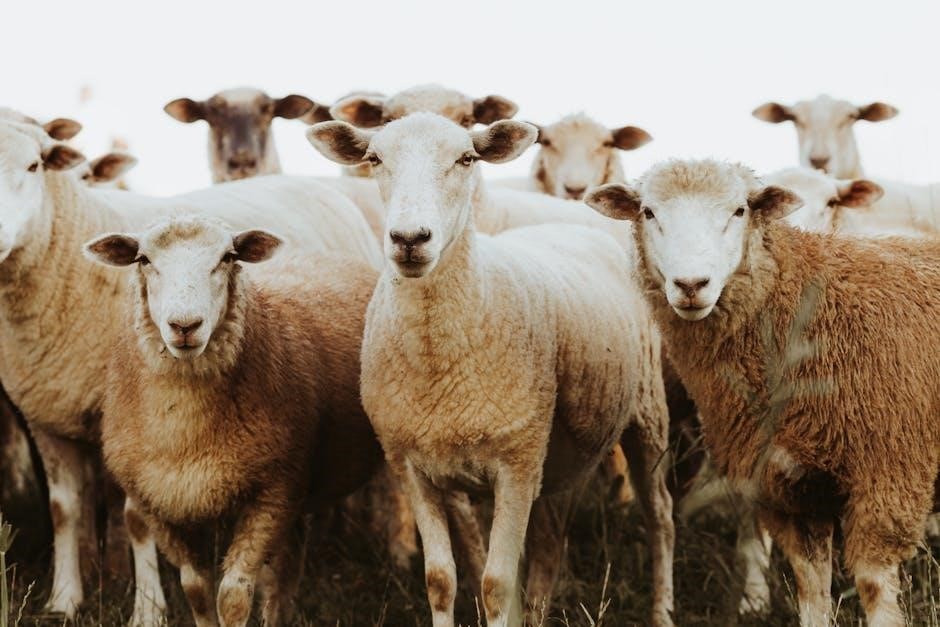William Deresiewicz’s Excellent Sheep delivers a scathing critique of elite education, arguing that top colleges perpetuate inequality and fail to foster critical thinking or self-discovery․
Overview of the Book
Excellent Sheep: The Miseducation of the American Elite and the Way to a Meaningful Life is a provocative critique of the elite education system in the United States․ Author William Deresiewicz argues that top colleges and universities, despite their prestige, fail to foster critical thinking, creativity, and genuine self-discovery among students․ Instead, they prioritize profit, social status, and conformity, producing overly qualified but unfulfilled individuals․ The book is structured into four key sections—Sheep, Self, Schools, and Society—examining how elite education perpetuates inequality, stifles personal growth, and alienates students from meaningful learning experiences․ Deresiewicz calls for a radical rethinking of education to reclaim its purpose of cultivating thoughtful, engaged, and morally grounded individuals․
Author Background
William Deresiewicz is a renowned American author, essayist, and former professor at Yale University․ Known for his incisive critiques of higher education, Deresiewicz has written extensively on topics such as elite culture, student life, and the purpose of college․ His work often challenges the status quo, urging readers to rethink conventional narratives about success and education․ Before becoming a full-time writer, he taught English at Yale and Columbia universities, experiences that deeply informed his perspective on the elite education system․ Deresiewicz’s writing is characterized by his sharp wit, nuanced analysis, and commitment to fostering meaningful dialogue about the role of education in society․

The Book’s Structure
Excellent Sheep is divided into four thematic sections: Sheep, Self, Schools, and Society, each exploring distinct critiques of elite education and its broader implications․
Sheep
In the first section of Excellent Sheep, William Deresiewicz portrays elite students as highly accomplished yet lacking in initiative and critical thinking․ Despite their academic and extracurricular successes, these students are often described as passive and conformist, driven by external pressures rather than personal curiosity or passion․ Deresiewicz argues that the elite education system fosters a culture of compliance, where students prioritize grades and prestige over intellectual exploration and creativity․ This section highlights how the pursuit of excellence, as defined by elite colleges, often leads to a narrow, unfulfilling experience, leaving students feeling disconnected from their true selves and societal needs․
Self

In the Self section of Excellent Sheep, William Deresiewicz explores how elite education often undermines students’ ability to develop a genuine sense of identity and purpose․ He argues that the pressure to conform to societal and institutional expectations leads many students to prioritize external validation over personal growth․ This results in a disconnection from their true selves, leaving them feeling unfulfilled and uncertain about their place in the world․ Deresiewicz emphasizes the importance of self-discovery and autonomy, urging students to break free from the constraints of elite culture and embrace a more meaningful and authentic path․ This section critiques the emotional and psychological costs of a system that values achievement over individuality․
Schools
In Excellent Sheep, William Deresiewicz critiques elite educational institutions for prioritizing profit and prestige over meaningful learning․ He argues that these schools foster a culture of competition and conformity, discouraging students from exploring their true interests or developing critical thinking skills․ Instead, they focus on producing “excellent sheep” who excel at jumping through hoops but lack intellectual curiosity or independence․ Deresiewicz contends that this system fails to prepare students for the complexities of the real world, leaving them unfulfilled and disillusioned․ He calls for a reimagined education system that values creativity, self-discovery, and intellectual passion over superficial achievements and institutional reputation․

Society

In Excellent Sheep, William Deresiewicz examines how elite education shapes societal dynamics, perpetuating inequality and reinforcing class divisions․ He argues that these institutions fail to cultivate leaders capable of addressing societal challenges, as students are conditioned to prioritize status and security over meaningful engagement with the world․ The book highlights how the emphasis on profit and prestige in elite schools discourages students from pursuing careers in public service or the arts, leading to a lack of diverse perspectives in leadership roles․ Ultimately, Deresiewicz calls for a reimagined education system that fosters critical thinkers and ethical leaders, capable of driving societal progress and addressing systemic inequities․
Elite Education’s Flaws
Elite education prioritizes profit and prestige over intellectual growth, fostering inequality and stifling creativity, as institutions focus on maintaining status rather than nurturing critical thinkers․
Social Inequality
Elite colleges fuel social inequality by catering to the privileged, perpetuating a cycle where only the affluent gain access to top-tier education․ Deresiewicz argues that these institutions, despite their rhetoric of meritocracy, disproportionately favor students from wealthy backgrounds, leaving behind those with fewer resources․ This selective admissions process creates a system where opportunities are hoarded by the elite, further entrenching class divisions․ The focus on prestige and exclusivity discourages diversity in perspectives, limiting the potential for a more inclusive and equitable education․ This systemic bias not only undermines social mobility but also reinforces the notion that success is reserved for the few, rather than being accessible to all․
Profit Over Education
Elite colleges prioritize profit over education, as highlighted in Excellent Sheep․ High tuition fees, expensive facilities, and faculty hired for research grants often overshadow the quality of teaching․ Deresiewicz argues that these institutions focus on their brand and rankings to attract more students, rather than fostering meaningful learning experiences․ The emphasis on prestige and revenue creates a system where education becomes secondary to financial gain․ This commercialization of education alienates students from the true purpose of higher learning, turning colleges into businesses rather than places of intellectual growth and self-discovery․ The pursuit of profit undermines the educational mission, leaving students disenchanted and unprepared for life beyond campus․
Student Impact
Elite students often feel depressed and lost, pressured by high expectations and lacking true purpose, as revealed in Excellent Sheep․
Psychological Toll
Excellent Sheep reveals the profound mental health struggles elite students face, including anxiety, depression, and burnout․ The pressure to conform and achieve, coupled with a lack of genuine purpose, leaves many feeling lost and unfulfilled․ Deresiewicz argues that the relentless pursuit of success in elite education often comes at the cost of students’ emotional well-being, fostering a culture of stress and disengagement․ This mental strain not only affects their academic experience but also hinders their ability to develop meaningful life goals and personal identity․ The book highlights how the elite education system fails to nurture students’ emotional and intellectual growth, leading to widespread dissatisfaction and disorientation among graduates․

Path to Meaningful Education
Deresiewicz advocates for a reimagined education system focused on fostering curiosity, critical thinking, and self-discovery․ He emphasizes the importance of shifts in institutional priorities, encouraging colleges to value intellectual exploration over profit and prestige․ By creating environments where students can engage deeply with ideas and develop personal passions, education can become a transformative experience․ Deresiewicz also suggests reforms such as reducing admission pressures, promoting interdisciplinary learning, and encouraging meaningful faculty-student interactions․ Ultimately, he envisions education as a catalyst for personal growth and societal contribution, urging a move away from the current model that prioritizes elitism and conformity․

Reception and Reviews
Excellent Sheep has sparked significant debate and garnered both praise and criticism․ Reviewers have lauded Deresiewicz for his bold critique of elite education, with many appreciating his call for reform and emphasis on fostering critical thinking․ The book has been described as a “groundbreaking manifesto” and a “provocative critique” of the higher education system․ However, some critics argue that Deresiewicz’s arguments oversimplify the complexities of elite institutions and student experiences․ Despite mixed reviews, the book remains a pivotal work in the conversation about the purpose and value of higher education, challenging readers to rethink their assumptions about what colleges should achieve․
In Excellent Sheep, William Deresiewicz challenges the status quo of elite education, urging a shift toward fostering critical thinking and self-discovery․ He advocates for colleges to prioritize meaningful learning over profit and prestige, emphasizing the need for students to find their own paths․ While some critics argue his views are too simplistic, the book remains a powerful call to reform․ Ultimately, Deresiewicz hopes to inspire a reimagining of higher education, where students emerge not just as skilled professionals, but as thoughtful, engaged individuals capable of contributing meaningfully to society․ His arguments continue to resonate, sparking vital conversations about the future of education․
